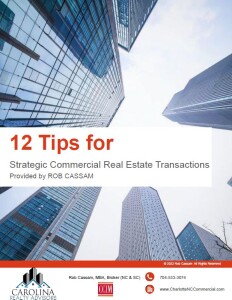This month’s newsletter has just been released! Check out the latest tips for tenants and users of commercial real estate space.
In this issue
- Why Warehouses Are A Great Investment
- How To Control But Not Own Property With An Option
- What You Must Know About Tax Deferred Exchanges Before Buying or Selling
- How To Avoid Costly Mistakes In Commercial Real Estate
- What Really Is Commercial Real Estate Representation
When Syndicates, partnerships, investment companies and their individual participants look at investments in commercial properties, many tend to look at properties that have that bewitching charm of glamour in brochures. A beautiful office building or an enclosed shopping center seem to have a more acceptable “status” as an investment property. These buildings can be nice to drive by and point out as “our” investment. Originally, any property designated as a “warehouse” would always be located in areas zoned for industrial use. There is not nearly as much allure in a squat bulky warehouse building. The physical attractiveness is not there in color flyers and photographs. However, as money makers, these bulky buildings can be a very profitable real estate investment…..(more)
Some investors look for the short-term investment with less of an emphasis on “doing business” and more pre-investment research on controlling property for the maximum gain in the short term. These investors often use the option or purchase-option. Traditionally, most real estate investors have been attracted to commercial real estate opportunities. Typically these investors have been well rewarded for their investment. Properties that are designed for “doing business” proliferate and succeed as businesses grow and diversify and become more and more profitable. For investors to be successful it is normally important to understand the operation of the particular commercial enterprise involved in the real estate investment…..(more)
The following are points that participants in a tax-deferred exchange should keep in mind when starting an exchange transaction: Even though an exchange may be tax-free at the federal level, it may be taxable at the state or local level. …(more)
Investors sometime make investments in real estate that turn out badly. They may then blame the loss on the “real estate cycle” when there were mistakes that could have been avoided by better planning and analysis. Based on data obtained through interviews with more than 200 real estate practitioners, several costly mistakes were identified and discussed. Here are three of them…..(more)
There are a number of ways to buy, sell or exchange investment or commercial real estate. Having the knowledge of what you can do in some tax situations can be the difference between an annual profit or loss in a property that you intend to acquire or one that you already have in inventory. The professional commercial real estate broker is in the position to represent clients in real estate transactions by setting up sales, exchanges, leases, purchase and sales of options, and management of real estate. A professional real estate practitioner must stay aware of current tax laws and court decisions in order to structure transactions, but does not give legal or tax advice (unless he/she is also an attorney or a certified public accountant). In any complex transaction that might result in changes in any owner’s legal or tax situation, the other members of the “consulting team” should be the owner’s attorney and CPA. We always recommend meeting with these other professionals during the planning and closing of major real estate transactions…..(more)




